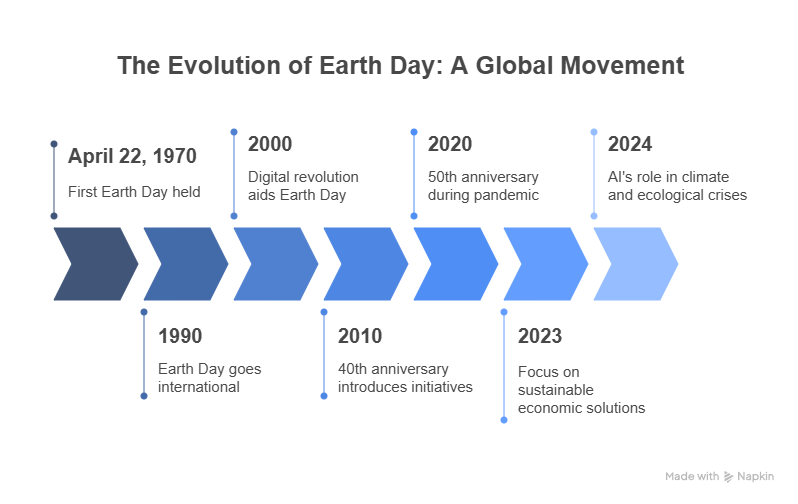- Article Summary
-
Earth Day, celebrated annually on April 22, is a global event dedicated to environmental protection and awareness. It was first held in 1970, when more than 20 million people across the United States took to the streets to protest environmental degradation. Spearheaded by U.S. Senator Gaylord Nelson, this landmark event marked the beginning of the modern environmental movement. Over time, Earth Day has grown into a worldwide observance, engaging over a billion people in more than 190 countries.
The purpose of Earth Day is to raise public consciousness about environmental issues such as climate change, deforestation, biodiversity loss, and pollution. It serves as a catalyst for individuals, organizations, and governments to take action, launch green initiatives, and make sustainable choices. Earth Day fosters a sense of global solidarity and responsibility for the well-being of our planet.

Key Themes and Activities of Earth Day
Each year, Earth Day adopts a specific theme that highlights a pressing environmental challenge. Recent themes have included “Restore Our Earth,” “Invest in Our Planet,” and “Climate Action.” These themes guide the planning of events, campaigns, and educational programs worldwide.
Activities on Earth Day vary widely and include community cleanups, tree planting, recycling drives, climate marches, art exhibitions, and educational workshops. Schools, non-profit organizations, and corporate entities often host sustainability fairs and eco-challenges. Digital platforms also play a growing role, offering webinars, virtual protests, and social media campaigns to amplify the Earth Day message.
The Earth Day Network, the world’s largest environmental movement organizer, coordinates efforts globally and encourages people to take “Green Actions.” These actions include reducing plastic use, conserving energy, switching to renewable power, and advocating for stronger environmental policies.

The Impact of Earth Day on Policy and Behavior
Earth Day has played a significant role in shaping environmental policy and promoting eco-conscious behaviors. The first Earth Day helped galvanize support for critical legislation in the United States, including the Clean Air Act (1970), the Clean Water Act (1972), and the Endangered Species Act (1973). Globally, it has influenced international agreements like the Paris Climate Accord and the Kyoto Protocol.
Public awareness campaigns associated with Earth Day have helped to reduce single-use plastics, increase recycling rates, and promote energy efficiency. It has also influenced the rise of green consumerism, as more people prioritize sustainable products and services. Earth Day events have encouraged businesses to adopt environmental, social, and governance (ESG) practices and improve supply chain sustainability.

Challenges and Criticisms
Despite its successes, Earth Day faces challenges in maintaining momentum and creating lasting impact. Critics argue that Earth Day has become too commercialized and symbolic, with limited tangible results. Many companies engage in “greenwashing,” promoting environmentally friendly images without making substantive changes.
Moreover, while awareness has increased, global greenhouse gas emissions continue to rise. Developing countries face disproportionate environmental risks due to limited resources and inadequate infrastructure. There is also concern that Earth Day activities are often short-lived and fail to result in long-term behavior change.
To address these issues, environmental leaders advocate for year-round engagement and systemic change. They emphasize the importance of accountability, equity, and grassroots action in tackling complex environmental problems.
The Future of Earth Day: A Path Toward Sustainability
Looking ahead, Earth Day is poised to evolve in response to emerging environmental crises. The focus is increasingly shifting from awareness to action, from individual choices to systemic reforms. Climate justice, technological innovation, youth activism, and corporate responsibility will be central to future Earth Day campaigns.
The integration of digital technology and big data analytics enables more precise monitoring of environmental health and the effectiveness of green initiatives. Educational programs are expanding to include climate literacy in school curriculums, ensuring that future generations are equipped to lead sustainability efforts.
Ultimately, Earth Day remains a powerful symbol of global unity and a call to action. It reminds us that environmental stewardship is not just a one-day commitment, but a lifelong journey toward a healthier, more sustainable planet.
Why Work with ASUENE Inc.?
ASUENE USA Inc., a subsidiary of Asuene Inc., is a key player in carbon accounting, offering a comprehensive platform that measures, reduces, and reports emissions, including Scope 1-3, with expertise in decarbonization. Asuene serves over 10,000 clients worldwide, providing an all-in-one solution that integrates GHG accounting, ESG supply chain management, a Carbon Credit exchange platform, and third-party verification.
ASUENE supports companies in achieving net-zero goals through advanced technology, consulting services, and an extensive network.


